- Home
- M. K. Hume
King Arthur: Warrior of the West: Book Two Page 19
King Arthur: Warrior of the West: Book Two Read online
Page 19
Then, standing directly before his king, the healer willed himself to carry out the task that was now before him.
With a tightening of his whole body, and with his left hand flat on the shaft, he punched the broken stump of the arrow shaft deep into Artor’s shoulder.
Odin watched in horror as the arrowhead appeared out of the back of the High King’s shoulder; he would have struck at Myrddion, but the healer’s eyes quelled him with a glance.
Returning to the exit wound, Myrddion fixed the arrowhead firmly in a pair of large tongs. Then, with a great flood of blood, the healer pulled the arrowhead and the broken shaft clear through Artor’s shoulder.
From both wounds, fresh blood pumped fiercely. Odin would have covered the chest wound, but Myrddion slapped his hand away.
‘Don’t touch him with your hands if you truly care for our king,’ he said sharply. ‘The flow of blood will cleanse the wounds and can make our work easier.’
Only then did Myrddion pause and wash his hands.
‘I need fresh cloth, Fynn. It must be clean and untouched. And I need the bottle of salve and the glass jar in my horse bag. Hurry!’
Fynn hurried to one of the supply wagons where neat boxes of clean wood held the battle supplies intended for the healers. With clean hands and a pair of tongs, he extracted folded cloth which he brought back to Myrddion. Then, he fetched a pottery jar with the Roman numeral X marked upon it. Other jars, with different numbers, rested in nests of straw.
Myrddion’s other satchel also sat on the seat of the cart. Hesitantly, as if he was intruding into a private room, Fynn rummaged through its neat compartments until he found a precious glass jar. His task completed, he returned to Myrddion and the royal patient with a mumbled apology for his tardiness.
‘No, Fynn, you’ve done well. Now, watch carefully. If anything should happen to me, this is what you must do.’
The healer then swabbed the wounds clean and poured some of the contents of the glass jar into both wounds.
‘This is apricot brandy,’ he told his assistant. ‘I use it to kill those humours that cause wounds to rot.’
He paused to survey his work. The wounds bubbled and hissed as the liquid began to bite into them.
‘Now mix the herb poultices on two clean pieces of cloth,’ he added, almost as if speaking to himself. ‘But don’t use your hands to mix it. There’s a clean wooden spoon in the jar. Good. Very good.’
Myrddion gingerly inserted one piece of vile, green-covered cloth over the frontal wound, and then placed the other on the incision in Artor’s back.
‘Now, wrap him in fresh linen, and bind it tightly. The pressure will help the fragments of bone to knit and will keep the poultice in place. Use as much cloth as you need. I’d rather use too much than too little.’
He glanced across at the Jutlander, who was absorbing the surgical process with an awestruck expression on his face.
‘You may clean your master now, Odin. But don’t touch his bandages. Cover him, and keep him warm. All else is in the hands of Mithras.’
Odin commenced the process of cleansing his master’s torso of blood. When he had completed this task, he wrapped Artor’s upper body in a length of new wool, and then sat with Artor’s head resting back against his chest.
As Odin held his king in his embrace, he sang a tuneful outlander song that seemed, somehow, to ease the hearts of restless, agony-wracked men in Myrddion’s makeshift hospital.
Myrddion and Fynn went back to their grim nursing tasks.
Odin watched as other men died, and noted that it was always Myrddion’s fingers that closed their eyes. Other patients came limping into the circle and it was Myrddion’s hands that cauterized their wounds with hot iron, and Myrddion’s gentle fingers that smoothed thick salve on to the smoking wounds. Those who could walk away bowed in gratitude to the white-haired healer as he sewed wounds together, embraced the dying, and eased the passage of the dead.
The sky was still pitch black when Artor awakened, his eyes dazed with pain. Myrddion was immediately by his side.
‘What hour is it?’ Artor muttered in a hoarse voice as he struggled fitfully to get away from Odin’s embrace.
‘It’s nearly an hour before sunrise. Had you not woken naturally, I’d have been forced to bring you back to consciousness. I gave you my word, Artor.’
‘I thank you, my friend. Can I dress now? The warriors must see me abroad.’
‘The arrow is out, Artor, and I’ve cleansed the wounds and applied poultices. You were lucky, for that arrowhead was wickedly barbed. I could never have drawn it back out through the point of entry in your flesh without inflicting lasting damage to you.’
Myrddion pressed a small barbed arrowhead into Artor’s nerveless fingers.
‘It’s time now to see if I am still a healer,’ he added, as he called Fynn to bring the apricot brandy and the salve, along with a supply of fresh bandages.
Artor shivered as the night air touched his flesh, but Myrddion assured him that the wounds showed no sign of heat.
‘But we must be certain, my lord,’ and he poured more of the potent liquor on to the flesh where it foamed against the edge of the wound.
The High King cried out in pain, but the cool poultice offered immediate relief. The process was then repeated on the incision in Artor’s back.
Pre-warned this time, Artor clutched the arrowhead and his amulet and bore the pain as manfully as he could. When he was bandaged and wrapped once more, Myrddion offered him a cup of some brackish tea, a brew that Artor eyed suspiciously.
‘The sky will soon lighten in the east, my king, and you must perforce return to your duties. I have placed a little poppy juice in that herb tea, but you will not fall asleep from the little I have given you. You may feel a little distant from your pain, but it’s just enough to allow you to heal and yet maintain command of the battle. Trust me, my lord, for I don’t lie to you.’
Artor managed to grin, and then swallowed the vile-tasting concoction.
‘Now, let Odin feed you, but you are to have no wine, mind. Eat red meat if you can, and pad your cuirass before you don it. I will send more of the tea before noon. Have no fear, for I am certain that we’ll see Caer Fyrddin fall together.’
The besieged camp was a hotbed of speculation, for some men swore that the High King was dead, a rumour made believable by the presence of Targo at the sentry fires. The old legionnaire swore to the doubters that the High King lived, but fear swept the ranks with a sour odour of its own, the rank smell of defeat.
When the sun commenced its slow rise over the horizon at first light, Targo ordered the men to stand to and take up their positions. They obeyed, but their shoulders were bowed and their eyes were shifty under their helmets. Targo feared that some warriors might run when the Saxons appeared.
A ragged cheer began in the centre of the camp and swelled even higher as the tall figure of Artor moved casually towards the shield wall.
‘Artor! Artor! Artor!’
The cry rang out until the carrion birds feasting on the dead Saxon bodies rose in a cloud of black wings. Pale, a little drawn around the mouth, but undoubtedly alive, Artor walked on his own two legs, in full battle armour, to stand in his accustomed place on the knoll.
As the noise stilled, Artor spoke to the men. Those who could not hear him had the message relayed until the last one hundred and twenty men on the wall, the wounded and the hale, heard the High King’s orders.
‘We came to bring justice for the murder of our emissaries of peace. We came to drive the western Saxons into the sea and to end years of war. Now is the time of reckoning. This day will be long, but we are the Army of the Dead, are we not?’
Their throats were now raw, but the men shouted back the single word, ‘Aye!’
‘We brought clay and woad with us to paint our faces. Let us do so today, so that the enemy will see skulls under every helmet. Let them gaze upon us and be afraid.’
Again, the cheerin
g and affirmations of loyalty were shouted until even the gulls ceased their eager hunt for fresh human flesh.
Then Artor smeared white clay upon his own pale face, leaving circlets for his eyes and his mouth that followed the contours of the bones of his face. Odin lifted his golden helmet and placed it over Artor’s bound hair, and a skull looked back at him in the pale first light.
The men cheered wildly at the sight of their king’s face, and men painted each other with the form of the skull. They found their black cloaks and shrouded themselves in sable and called out towards the enemy lines.
‘We are the Army of the Dead. You may try to kill us if you can!’
Then Artor’s depleted force waited for Glamdring’s warriors to return.
Targo joined his master, and relief shone from his aged eyes. ‘Thanks be to Mithras that you’re still alive and standing. Only a High King could stiffen the spines of the men on a day such as this. We protect such a small pocket of land, so pray that we can hold till night falls.’
‘We will hold,’ Artor replied distantly, and Targo saw that the shark’s eyes of his king were even colder than usual.
‘The wound was minor then?’ Targo asked, more to break the preternatural silence than out of any curiosity.
‘Just don’t make me laugh, and don’t allow me to move too suddenly,’ Artor replied with something like his old humour.
‘Thank Mithras for that. Here they come!’
The Saxons fought savagely through the walls of their own dead and battered themselves against the shield wall. Skull faces looked back at them, and even the most determined Saxons began to feel the first frissons of superstitious fear.
Against all reason and odds, Artor’s line managed to hold.
The Saxons came again at noon, and Pelles’s men used the last of their scavenged arrows on the massed Saxons before the shield wall took the shock - and more. As smooth as a deadly dance, men fell and were replaced even while their bodies were being passed backward. The Saxons fell in their scores, and their bodies were piled up against the defensive wall.
Later, as darkness fell, the Saxons retreated to their own lines.
The shield wall was now alarmingly thin, and Artor knew that his Celts were almost done. Their losses were still slight compared with those of the Saxons, but there were very few Celts who did not carry a wound of sorts, and the shield wall had slowly retreated until it was now at the foot of the knoll. If Llanwith and Lot did not come on the morrow, then Artor’s army would be annihilated.
Artor was amazed when a cheerful Pelles joined him in his tent atop the knoll. The one-eyed archer threw himself on to a stool and sighed cheerfully as he rested his swollen feet.
‘We keep collecting some of our own arrows back, so we will have something to throw at them tomorrow,’ he told his master. ‘But now I seem to have more archers than my arrow supply can meet. I thought I’d offer you twenty of my boys to put into your line, for it seems hellish thin to me.’
‘Why are you so cheerful, Pinhead?’ Targo snapped. ‘By any estimation, the situation here is quite grave.’
‘Tomorrow is as good a day to die as any. I expected to meet my end years ago, and I’m still here. I’ll trust to Artor’s luck, for he’s always been a good bet in the past. Remember the loot we collected at Anderida? Shite! That was one hell of a battle. But this place? Mori Saxonicus? They’ll be telling tales of the shield wall when you and I have been dead for a hundred years.’ He smiled across at the old Roman veteran. ‘And I wish you wouldn’t call me Pinhead. My son wouldn’t like it.’
Targo gaped. ‘What woman would have children with you? You’re hardly the prettiest warrior in the army.’
Pelles attempted to look affronted, but his humour shone through his muddy eye.
‘I’ve got a woman and two children under twelve, a boy and a girl, so no more use of Pinhead, old soldier.’
‘Let’s hope your daughter doesn’t look like you, my friend.’
With Artor’s heartfelt praise to warm him to his scuffed, black boots, Pelles left shortly afterwards to return to his archers. He was immediately replaced by the High King’s foster-brother, Caius, who asked for admittance to the tent.
Like Pelles, Caius too was sanguine. He had borne the brunt of the fighting and his loss of men had been horrific, but Caius seemed oblivious to the blood and destruction that had taken place around him. If anything, he appeared feverishly confident as he gave his report to Artor.
Blood had drenched Caius’s black cloak so that it hung in stiff folds from his shoulders. The steward’s arms and hands were clean, for Caius was as fastidious as Artor, but his boots told a story of bloody mud, spilled brains and all the ghastliness of hand-to-hand fighting. Artor noticed, distantly, that Caius’s good humour stopped short of his eyes.
‘Whew, brother! You’ll bear some interesting scars from that wound. You must be the luckiest man I have ever known.’
Caius peered carefully at the wound and watched Myrddion work with a morbid interest until Artor became uncomfortable under the avid stare of his brother.
‘Should Llanwith and Lot fail us, Caius, I will be sorry to know that you will not see your children again,’ Artor said to distract him. ‘And I will regret the tears that Ector will weep for you.’
Caius snorted. ‘He’ll weep for you, perhaps, but not for me. My mother’s blood still lies between us like a wall of stone. And Julanna and the children will hardly miss me. Gods, they barely know me. I’ve spent years in your service, brother, but I’m not complaining. Still, I’ve enjoyed these many years with you, which is odd, considering I have always rather despised you. I wish it wasn’t so, and it doesn’t mean I want you to die. Quite the contrary, in fact. Unfortunately, I cannot help my feelings. It’s purely a matter of jealousy, I suppose, but you have achieved so much, and I have so little to show for my efforts at achieving glory.’
Artor’s face reddened and his jaw clenched. ‘You have a wife and children to sing your praises when you go into the shadows. When I pass on, there will be none who will care, apart from those few among us who are my true friends. And I can count them on the fingers of one hand. You’ve allowed yourself to resent a memory of the past and of what might have been, rather than a flesh and blood man.’
The king looked deeply into the eyes of his foster-brother, as if he could tear apart the veil of containment that made Caius an enigma.
‘Besides, Caius, men speak of your courage and your skill in battle with admiration. You obey orders, even impossible ones like those you have carried out during the last two days. Whether you care for me or not is immaterial to me. You are a valued ally and a gifted steward. What more do you want?’
Caius’s eyes dropped so that Artor couldn’t see his thoughts. Everything you have, brother! Everything! The love, the respect . . . everything!
Caius laughed ironically, and Odin rose threateningly from his position at Artor’s back.
‘You can call off your dog, Artor, for I could never do you any harm. I know that I am nothing without you but an empty bag of piss and wind. I simply want you to know that I have always attempted to serve you as well as I could, and I choose to speak the truth on what might be my last night.’
‘I understand and I’m grateful, Caius. I intend to ensure that we continue to speak our thoughts in the future, for honesty is of more value to me than any amount of praise or false love. I have always considered you to be a fine leader and a gifted warrior, for all that you believe yourself to be inadequate. At any road, I still consider it is premature to consign ourselves to the darkness of death tomorrow.’
Caius snickered, and the sound had no humour in it, only threat. ‘Yes, there are still Saxons left to kill, I suppose. That’s some consolation, I admit. Sleep well, Artor, and I’ll pray that your luck holds.’ He turned and slid out through the tent flap.
Myrddion stood back and admired his handiwork. He noticed the pain in Artor’s eyes, and set to work grinding another cup
of herb tea in a bowl of stone, using a pestle of the same dense, grey material.
‘That man will cause you trouble yet, Artor,’ the older man whispered. ‘Caius still makes my flesh creep, but this day has been full of horrors. He’s right, you know. For all that he has risen high in the land and has proved his worth a thousand times, the Severinii will always stand behind him in my mind. He’s also correct to be jealous of you, for your men do love you. But they have no feelings for Caius. They obey him and they respect him, but nobody loves Caius. There is something in him that repels most men. I suppose he is to be pitied.’
Artor flinched a little. ‘His father still loves him, regardless of what Caius thinks, and I also feel some affection and pity for him. I’m not sure why exactly, but he is the only close link I have with my childhood . . . with old Frith . . . and Mistress Livinia . . .’ Artor’s voice trailed away and Myrddion feared that his master might weep under the triple pressures of physical pain, the duties of command and the terrible burden of waiting. Knowing that tears would shame his king, Myrddion discreetly turned his back and poured hot water on to his concoction. When he again faced his king, a cup in one hand, Artor was composed once more.
‘Drink this, my lord, and rest. The night will be short enough, and Odin will watch over you.’
‘Caius is as he ever was: a tool fitted to my hand. I’ve always known that he is best used in battle, where his tendency to cruelty is called courage. I only fear for him in times of peace.’
‘Drink, Artor. Odin will wake you if Ironfist should determine to attack during the night. As the kingdom stands, peace will be a long time coming, so Caius will be safe for many years.’
Myrddion slipped out of the tent and returned to his dying charges. Terrible as his duties were, the healer knew that they were not as arduous or as soul-destroying as the burdens that were carried by his king.
Artor slept, and the night gave way to a red and glowing sun in the eastern sky.

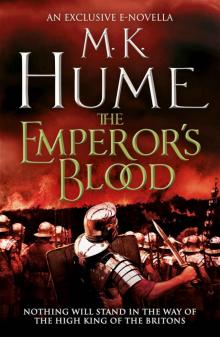 The Emperor's Blood (e-novella)
The Emperor's Blood (e-novella)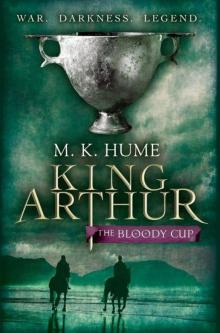 King Arthur: The Bloody Cup: Book Three
King Arthur: The Bloody Cup: Book Three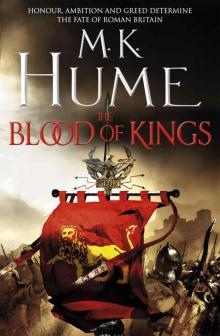 The Blood of Kings: Tintagel Book I
The Blood of Kings: Tintagel Book I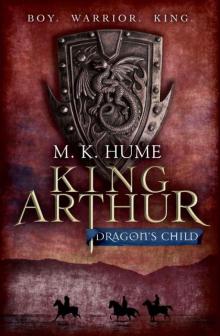 King Arthur: Dragon's Child: Book One (King Arthur Trilogy 1)
King Arthur: Dragon's Child: Book One (King Arthur Trilogy 1)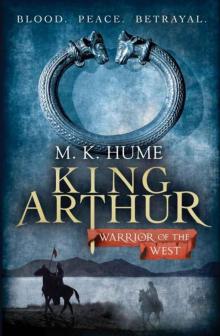 King Arthur: Warrior of the West: Book Two
King Arthur: Warrior of the West: Book Two The Storm Lord
The Storm Lord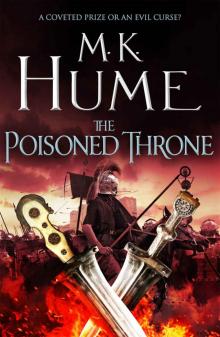 The Poisoned Throne: Tintagel Book II
The Poisoned Throne: Tintagel Book II![M. K. Hume [King Arthur Trilogy 04] The Last Dragon Read online](http://i1.bookreadfree.com/i2/04/07/m_k_hume_king_arthur_trilogy_04_the_last_dragon_preview.jpg) M. K. Hume [King Arthur Trilogy 04] The Last Dragon
M. K. Hume [King Arthur Trilogy 04] The Last Dragon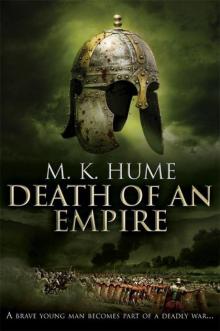 Prophecy: Death of an Empire: Book Two (Prophecy Trilogy)
Prophecy: Death of an Empire: Book Two (Prophecy Trilogy)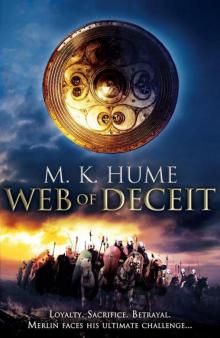 Prophecy: Web of Deceit (Prophecy 3)
Prophecy: Web of Deceit (Prophecy 3)